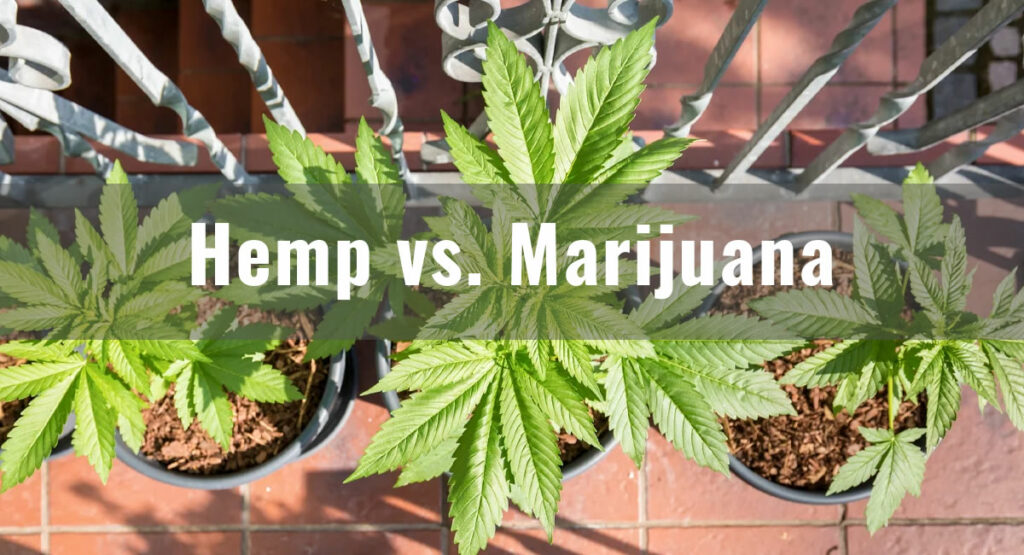Hemp and marijuana are often confused as the same plant. However, they have some important differences in terms of THC content, uses, legal status, and more. Here we explain the key distinctions between hemp and marijuana varieties of cannabis.
Hemp and Marijuana Come From the Same Species
Hemp and marijuana both originate from the Cannabis sativa plant species. They are essentially different strains of the same plant.
Hemp is commonly grown for industrial uses like textiles, paper, animal feed, foods, and more. Marijuana is bred specifically for high THC content and is commonly used for its relaxing and euphoric properties.
But what makes them unique from one another? It comes down to their chemical compositions.
The Key Difference – THC Content
THC, or tetrahydrocannabinol, is the main psychoactive compound in cannabis responsible for the characteristic mental high.
Legally, the distinction between hemp and marijuana lies in the THC concentration:
- Hemp – Defined as cannabis with 0.3% or less THC content by dry weight. At this low level, hemp does not have psychoactive effects.
- Marijuana – Legally defined as cannabis that contains more than 0.3% THC by dry weight. Marijuana strains are bred specifically to have high THC for psychoactivity.
So in summary, if a cannabis plant has over 0.3% THC, it is classified as marijuana instead of hemp.
Uses of Hemp vs. Marijuana
Due to the different levels of THC, hemp and marijuana are used in very different ways:
Hemp Uses
- Industrial applications like textiles, rope, paper, building materials.
- Foods and beverages, such as hemp seeds, hemp milk, and hemp oil.
- Beauty products like soaps, lotions, and cosmetics.
- CBD oil and other hemp extracts.
Marijuana Uses
- THC-dominant cannabis strains used for euphoric or relaxing properties.
- Medical cannabis products that require high THC to treat conditions like chronic pain, PTSD, cancer, neurological disorders.
- Recreational adult use cannabis products in states where it is legal.
Both hemp and high-CBD marijuana strains can be sources of non-intoxicating CBD oil products, but marijuana strains contain higher THC levels that can cause impairment.
A Brief History and the Racist Origins of “Marijuana”
Hemp has been cultivated for millennia and originally the term “cannabis” was used for this plant species. In the 20th century, the term “marijuana” arose in the U.S.
As Mexican immigrants entered the U.S. fleeing the Mexican Revolution, racist sentiment grew. The term “marijuana” became associated with Mexicans as an ethnic slur.
Government propaganda spread myths about cannabis while perpetuating racist Mexican stereotypes. This ultimately led to the criminalization of cannabis in the 1930s under the name “marijuana.”
Many advocates argue we should abandon the racist term “marijuana” in favor of scientifically accurate terminology like “cannabis.”
The Legal Status of Hemp and Marijuana
The 2018 Farm Bill federally legalized hemp and hemp-derived CBD products in the United States, as long as they contain 0.3% THC or less. However, marijuana remains federally illegal as a Schedule 1 substance.
On a state level, marijuana legality varies greatly. In some states recreational and medical marijuana is fully legalized, while others only allow low-THC medical marijuana programs. And some states still prohibit all marijuana.
In summary:
- Hemp and hemp-derived CBD are legal federally but with some state restrictions.
- Marijuana is federally illegal but legalized by some state laws.
No matter what state you live in, it’s important to verify your local laws before purchasing or using marijuana products.
CBD Can Come From Either Hemp or Marijuana
CBD, or cannabidiol, is a popular natural remedy for issues like pain, anxiety, and insomnia. CBD can be extracted from either hemp or marijuana plants.
However, CBD products are only federally legal if they are derived from low-THC hemp. CBD from marijuana plants remains a legal gray area at the federal level.
Key Differences Cheat Sheet
| Characteristic | Hemp | Marijuana |
|---|---|---|
| THC content | <0.3% | >0.3% |
| Uses | Fibers, building, food, beauty, CBD | THC-dominant recreational & medical cannabis |
| Legal status | Federally legal | Federally illegal, legalized by some states |
| Effects | Non-psychoactive | Psychoactive high |
Conclusion
While hemp and marijuana come from the same species of plant, they have important differences that influence their uses, legal status, and effects. By understanding the key distinctions between hemp and marijuana, you can make informed choices about which cannabis products are right for your needs.
- UK Announces Mandatory Vape Tax and Duty Stamps from 2027 - February 10, 2026
- Sri Lanka Travel 2026: Total Ban on Cigarettes & Vapes - February 5, 2026
- NY Tax Proposal: Hochul Targets ZYN with 75% Levy - January 29, 2026


